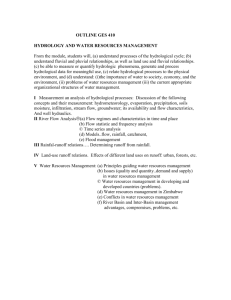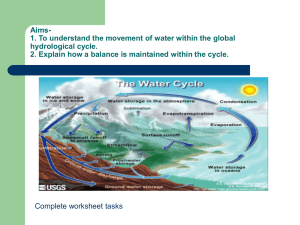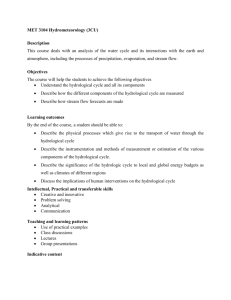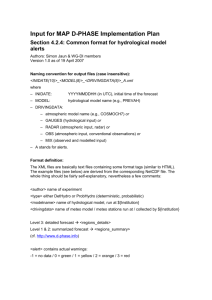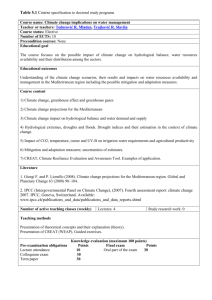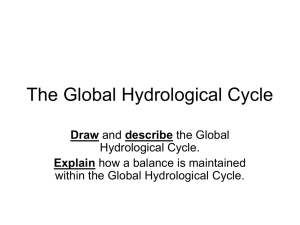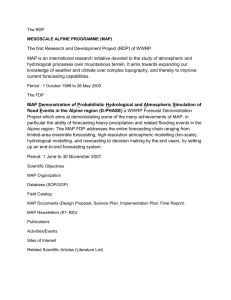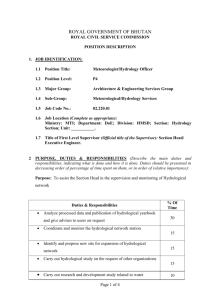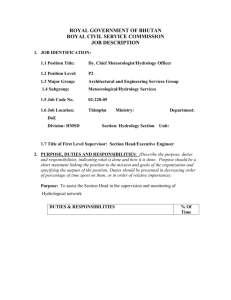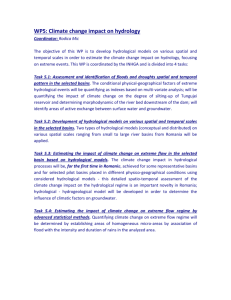project 11-06-01
advertisement
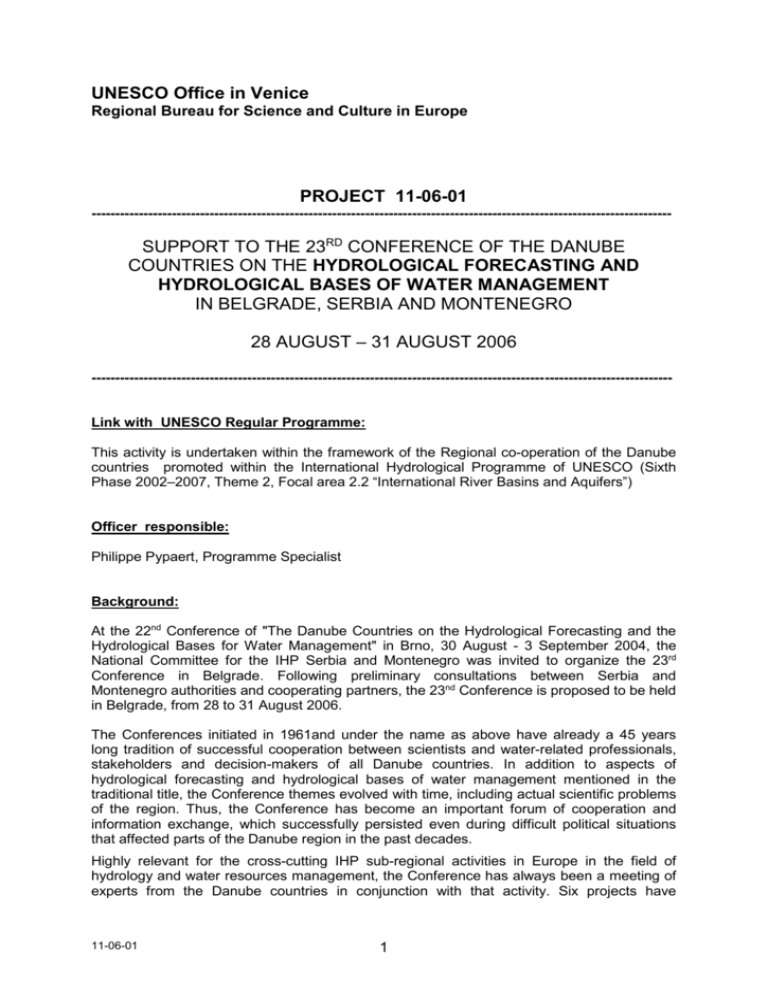
UNESCO Office in Venice Regional Bureau for Science and Culture in Europe PROJECT 11-06-01 --------------------------------------------------------------------------------------------------------------------------- SUPPORT TO THE 23RD CONFERENCE OF THE DANUBE COUNTRIES ON THE HYDROLOGICAL FORECASTING AND HYDROLOGICAL BASES OF WATER MANAGEMENT IN BELGRADE, SERBIA AND MONTENEGRO 28 AUGUST – 31 AUGUST 2006 --------------------------------------------------------------------------------------------------------------------------- Link with UNESCO Regular Programme: This activity is undertaken within the framework of the Regional co-operation of the Danube countries promoted within the International Hydrological Programme of UNESCO (Sixth Phase 2002–2007, Theme 2, Focal area 2.2 “International River Basins and Aquifers”) Officer responsible: Philippe Pypaert, Programme Specialist Background: At the 22nd Conference of "The Danube Countries on the Hydrological Forecasting and the Hydrological Bases for Water Management" in Brno, 30 August - 3 September 2004, the National Committee for the IHP Serbia and Montenegro was invited to organize the 23rd Conference in Belgrade. Following preliminary consultations between Serbia and Montenegro authorities and cooperating partners, the 23nd Conference is proposed to be held in Belgrade, from 28 to 31 August 2006. The Conferences initiated in 1961and under the name as above have already a 45 years long tradition of successful cooperation between scientists and water-related professionals, stakeholders and decision-makers of all Danube countries. In addition to aspects of hydrological forecasting and hydrological bases of water management mentioned in the traditional title, the Conference themes evolved with time, including actual scientific problems of the region. Thus, the Conference has become an important forum of cooperation and information exchange, which successfully persisted even during difficult political situations that affected parts of the Danube region in the past decades. Highly relevant for the cross-cutting IHP sub-regional activities in Europe in the field of hydrology and water resources management, the Conference has always been a meeting of experts from the Danube countries in conjunction with that activity. Six projects have 11-06-01 1 currently been completed and/or published and the forthcoming Conference will provide an opportunity to discusse the launching of new co-operative projects (see also the resolutions of the Regional Meeting of the IHP National Committees of the Electoral Groups I and II of UNESCO that was held on 18-19 February 2002 in Berlin, Germany and on 22–23 March 2004 in Helsinki, Finland). An important topic of the Conference remains the advancement of hydrological forecasting of large floods, very much in line with the recently launched International Flood Initiative of IHP, a subject highly relevant for the Danube region which was in the last years hit by devastating floods that caused very large damages to the economies of the affected countries. The Conference will provide a discussion forum for scientific and research projects in particular in the field of ecohydrology and sediment management. Thus, the Conference can be considered as a fully pledged action within the framework of IHP-VI activity in the European region, and will be a significant contribution to the International Decade for Action “Water for Life”, 2005-2015. Of particular significance is that ISI (International Sediment Initiative of IHP) foresees the elaboration of a case study for the Danube basin, and the forthcoming conference would contribute to the setting the objectives and developing methods for that case study. It should be underlined that the application of ecohydrological concepts and methods to water resources management will be a substantial subject of the Conference. Among others, improved ecohydrological models, high-quality biophysical data sets, better access to remote-sensing imagery, facilitate better and more comprehensive understanding of the hydrological cycle over broad domains, and in near-real time. The basin scale is appropriate to assess water resources, comparing them with water uses and demand, in line with advanced concepts of integrated watershed management. In this regard, the Conference topics outstandingly agree with the objectives of focal area 2.2 of IHP-VI, on international river basins and aquifers. The themes and topics covered by the Conference will be the following: 1. Hydrological forecasting Real-time informational forecasting systems Short-term forecasts Long-term forecasts Rainfall-runoff processes modelling River flow propagation modelling Hydrological forecasts of other phenomena (sediment transport, ice phenomena, etc.) 2. Meteorological inputs for hydrological forecast Meteorological models Quantitative precipitation forecasts Satellite and radar data information Probabilistic hydro-meteorological forecast systems 3. Hydrological processes Hydrological balance models Soil-vegetation-atmosphere transfer models Ecological aspects of hydrological processes Groundwater and river interactions Ice and thermal regime processes 4. Erosion, sediment transport and sedimentation Monitoring of catchment and river bed/reservoir erosion and sedimentation 11-06-01 2 Modeling of erosion and sediment transport Morphology and river bed deformation 5. Water quality and ecohydrological processes Water quality monitoring (surface and ground water) Water quality modelling Transport and transformations of pollutants Water quality and sediments Interactions between hydrology and fluvial ecosystems 6. Water resources management Quantitative and qualitative water resources assessment Regionalization of hydrological characteristics Adaptation strategies of water resources in the context of land use and climate changes Decision support systems for water management and water resource conservation and protection Ecological and socio-economic vulnerability to hydrological extremes Flood processes and control The proposed themes and topics are in conformity with the objectives of regional cooperation within the framework of IHP. For instance, the theme “Hydrological forecasting” is relevant to Focal Area 2.1 “Extreme events in land and water resources management”, while the themes “Water quality and ecohydrological processes” and “Erosion, sediment transport and sedimentation” are in accordance with the FRIEND project. Topics “Water quality modelling” and “Water quality and sediments” are strongly linked with Focal Area 1.1 “Global distribution of resources water supply”. The topic “Water resources management” refers equally to the FRIEND project objectives, to Focal Area 1.3 “Integrated assessment of water resources in the context of global land-based activities and climate change”, and to Focal Area 2.4 “Methodologies for integrated river basin management”. It goes without saying that in its totality, the Conference of Danube Countries on Hydrological Forecasting and Hydrological Bases of Water Management is an essential part of activities promoted through Focal Area 2.2 on “International River Basin and Aquifers”. Theme 4 of the Conference is of direct relevance to the case study on sediment management in the Danube basin, which is an important issue of the ongoing International Sedimentation Initiative. The Conference will offer a forum to examine and discuss the hydrology-related objectives of the planned case study. Partners and their contributions: (1) A Local Scientific Committee has been set up as follows: Tioslav Petković - Republic Hydrometeorological Service of Serbia, Belgrade Zoran Radić - Faculty of Civil Engineering, University of Belgrade Stevan Prohaska - Institute "Jaroslav Černi", Belgrade Vojislav Vukmirović - Faculty of Civil Engineering, University of Belgrade Mihailo Anđelić - FAO, retired Ljiljana Gavrilović - Faculty for Geography, University of Belgrade Srđan Kolaković - Faculty of Technical Sciences, University of Novi Sad Miodrag Spasojević - Institute "Jaroslav Černi" 11-06-01 3 Ratko Živaljević - Faculty of Civil Engineering, University of Podgorica Borislava Blagojević - Faculty of Civil Engineering and Architecture, University of Niš Jaska Plavšić - Faculty of Civil Engineering, University of Belgrade Vesna Ristić - Faculty of Mining and Geology, University of Belgrade S. Bruk - Emeritus professor, Serbia and Montenegro (2) An International Scientific Committee of scientists and representatives of all Danube countries has been established. Their main task is to evaluate the quality of abstracts and full papers. They will give assistance to the authors in improving their scientific presentations and will help the organizers to classify the papers according to topics. The Committee is made up of: R. F. Schmidtke – Bayerisches Landesamt für Wasserwirtschaft, Munich, Germany D. Gutknecht – Institut für Hydraulik, Gewässerkunde und Wasserwirtschaft, Vienna, Austria J. Kubát – Czech Hydrometeorological Institute, Prague, Czech Republic J. Szolgay – Faculty of Civil Engineering, SUT, Bratislava, Slovak Republic M. Domokos – VITUKI, Budapest, Hungary M. Brilly – University of Ljubljana, Ljubljana, Slovenia O. Bonnacci – University of Split, Croatia S. Prohaska – Institute "Jaroslav Černi", Belgrade, Serbia & Montenegro M. Miloradov - President of NC IHP, Belgrade, Serbia and Montenegro S. Bruk - Emeritus professor, Serbia and Montenegro P. Stanciu – National Institute of Hydrology and Water Management, Bucharest, Romania K. Tzankov – Institute of Meteorology and Hydrology, Sofia, Bulgaria O. Lukyanetz – State Hydrometeorological Institute, Kiev, Ukraine P. Pypaert – UNESCO-BRESCE, Italy J. Bogardi - UNU-EHS Institute for Environment and Human Security0 I. Liška – ICPDR A. de Roo – Institute for Environment and Sustainability, EU Joint Research Centre, Ispra, Italy Partners Role IHP National Committee of Serbia and Montenegro (M.Miloradov and S. Prohaska) Contract administration and logistic In-kind and support to the conference organization financial Danube IHP National Committees Scientific coordination 11-06-01 4 Contribution In-kind Expected results: The Conference will offer an opportunity to present new methods and models embracing the whole area of the selected themes and topics. The Conference will provide an opportunity for discussing the challenging aspects of the integrated development of water resources and the need to forecast them with a greater lead-time. Abstracts were so far received from 180 registered participants of 16 Danube countries and from 10 participants of other countries, so that the expected attendance at the Conference is estimated at about 300 persons. The diversity of contributions will be remarkable, in particular in issues such as the coupling of meteorological with hydrological forecasts, ecological aspects of the hydrological cycle, anthropogenic changes (climate change and land use-land cover changes) as well as their impact on water resources and the sustainability problems of the biosphere as related to water resources. It is expected to achieve results of significant impact related to: Crossing disciplinary boundaries dividing hydrologists and limnologists/aquatic ecologists. Speakers will be invited to cover and discuss typical cases from their respective viewpoints and perspectives. Promotion of research projects on sustainable development of international river basins and relevant coastal areas, in particular of the Danube River Basin, by considering hydrological and limnological/ecological aspects within large spatial and temporal scales. Fostering assistance from, and collaboration between, international agencies (United Nations, European Union, etc.) in supporting research projects at the regional level. The Conference will allow to organize parallel working sessions of experts involved in cooperative research projects supported by UNESCO-BRESCE, such as the Danube River Water Balance or the Assessment of Climate Change Effects on the Hydrological Cycles in SEE, as well as to discuss new IHP initiatives e.g. the International Flood Initiative (IFI) and the International Sediment Initiative (ISI). All registered participants will receive a volume containing all abstracts, plus a CD of the Proceedings of the Conference. A scientific excursion to water management areas will be organized, as has been done during previous conferences. The proposed input of UNESCO-BRESCE would enable a greater number of scientists – and in particular young scientists – to attend the event. 11-06-01 5
